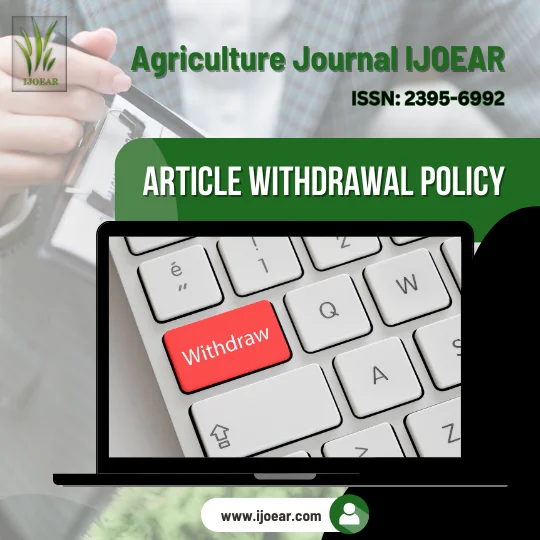 November 2025 Articles
November 2025 Articles Impact Factor: 6.69
Impact Factor: 6.69  Submit Article
Submit Article 
|
Citation Indices
|
All
|
Since 2020
|
|
Citation
|
6164
|
5117
|
|
h-index
|
31
|
29
|
|
i10-index
|
201
|
165
|
|
Acceptance Rate (By Year)
|
|
|
Year
|
Percentage
|
|
2024
|
11.09%
|
|
2023
|
15.23%
|
|
2022
|
12.81%
|
|
2021
|
10.45%
|
|
2020
|
9.6%
|
|
2019
|
14.3%
|
|
2018
|
17.65%
|
|
2017
|
16.9%
|
|
2016
|
22.9%
|
|
2015
|
26.1%
|

The International Journal of Environmental and Agriculture Research (IJOEAR), ISSN 2454-1850 (online), is committed to maintaining the integrity of scholarly communication. As a peer-reviewed journal, we uphold the highest standards of publication ethics and adhere to established practices to ensure a permanent and transparent academic record.
Occasionally, exceptional circumstances may arise that necessitate the withdrawal, retraction, or removal of published articles. These actions are taken with great care, following established protocols, and aim to balance the rights and responsibilities of authors, readers, and the journal itself.
This policy outlines the conditions, procedures, and ethical considerations associated with article withdrawal, retraction, removal, and replacement in IJOEAR.
The withdrawal policy serves the following purposes:
Withdrawal actions may occur under the following circumstances:
Articles accepted for publication but not yet formally published may be withdrawn under conditions such as:
Published articles may only be withdrawn in cases where:
In rare cases, an article may be withdrawn due to legal limitations, defamatory content, or potential risks to public health if acted upon.
The corresponding author must submit a formal withdrawal application, explaining the reasons for the request.
The corresponding author have to send a receipt of article withdrawal fee of 200 USD along with the application.
The editorial team reviews the application and consults with relevant board members.
If approved, the article is withdrawn from the journal database, and a notice is issued.
The editorial team may withdraw an article if ethical violations or errors are detected during or after the publication process.
Authors are informed of the decision, and a formal notice is issued.
Withdrawn articles are removed from the journal's database in PDF and HTML formats.
A notice replaces the withdrawn content, stating the reason for withdrawal and linking to the policy document.
Withdrawn articles are not reconsidered for republication in the journal.
Retraction is the process of formally invalidating the findings of a published article while preserving the record for transparency.
Articles may be retracted for reasons such as:
A retraction note titled "Retraction: [Article Title]" is published in a subsequent journal issue.
In the electronic version:
The reasons for retraction are detailed in the note, signed by the authors and/or editor.
Article removal is an exceptional action taken only when retaining the content poses legal, ethical, or public health risks.
An article may be removed under the following circumstances:
The metadata, including the article title and authors, are retained.
The text is replaced with a notice stating the reason for removal.
Replacement involves retracting a flawed article and replacing it with a corrected version.
Replacement is considered when:
A retraction notice is issued for the original article.
The corrected version is published with a link to the retraction notice.
A history of changes is documented in the database.
Authors play a critical role in upholding the integrity of the academic record. Responsibilities include:
The editorial team is responsible for:
Yes, but a formal application must be submitted, and the editorial board will review the request.
No, withdrawn articles are not reconsidered for republication in the journal.
The article may be retracted or removed, depending on the nature of the violation.
The final decision is made by the journal's editorial board, considering input from relevant experts.
Yes, there is charges associated with withdrawing or replacing a published article.
Withdrawal/Replacement Charges: If the authors request to withdraw or replace a published article, a charge of 200 USD may apply.
Acceptance: This charge is only applicable if the journal's editorial board approves the authors' request for withdrawal or replacement.
The Article Withdrawal Policy of IJOEAR is designed to uphold the highest ethical standards in publishing while preserving the integrity of the scholarly record. By clearly outlining the conditions and procedures for withdrawal, retraction, removal, and replacement, the policy ensures transparency and accountability in academic publishing. Authors and readers are encouraged to familiarize themselves with this policy to contribute to a fair and credible research environment.
For further information or guidance, please contact the editorial team.
For questions or clarifications regarding this Disclaimer, please contact the editorial office at info.ijoear@gmail.com or info @ijoear.com.com .
By accessing this website, you agree to the terms and conditions outlined in this Disclaimer. If you do not agree, please refrain from using the website and its services.